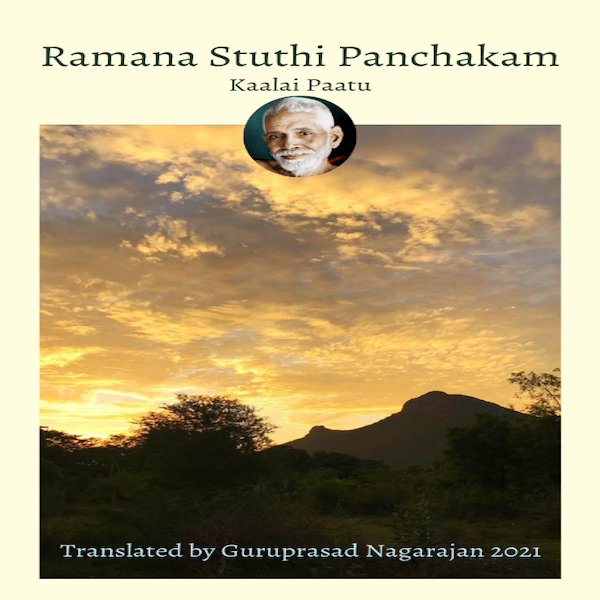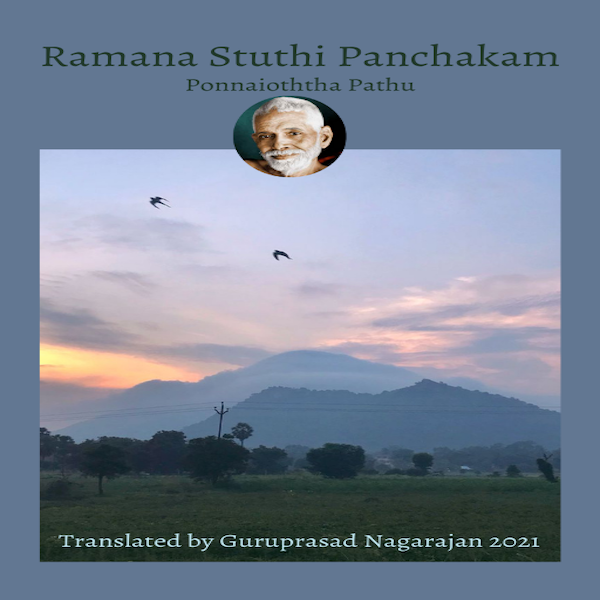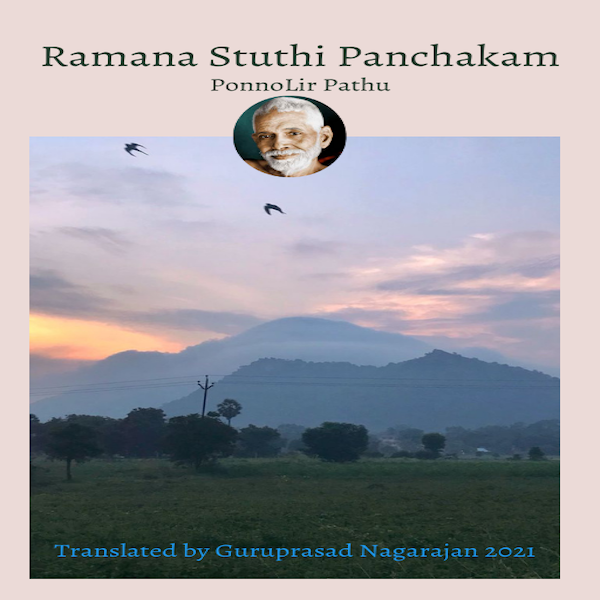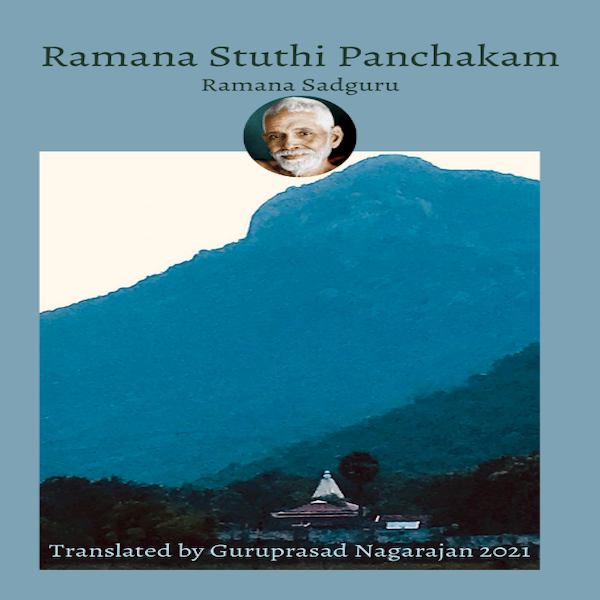Bhakthi yodu paNindhu nindridu
Bhakta kodiyar thangaLai:
Mukti mei karai kaati moodhari
Vutrida dhwaja mittavan.
Word meaning
bhakti = devotion; paNindhu = worship with humility; bhakta kodiyar = devotees; mukti = liberation; mei karai = true shore; moodharivu = true knowledge; dhwajam = flag.
Meaning
To the countless devotees (koti/kodi also means one crore in Tamil) who throng to his holy feet and bow down to him in humility, our Ramana,, hoisting a flag, shows the way to liberation and true knowledge.
The phrase ‘dwajam ittavan’ meaning carrying a flag occurs in Aksharamana malai where Bhagavan refers to Arunachala as the one carrying a flag to kill the ego of the devotees who approach him. Again we see another instance where SV sees Bhagavan as Arunachala.
24 kodiyit adiyarai kollunaik katti
kondengan vaazhvaen Arunachala
Meaning
Arunachala! How do I live with you when you (carrying a flag) are so intent on killing (the ego consciousness or I am the body idea of) your devotees?
Explanation
Destroying the ‘I am the body’ idea (jiva bodham) is referred to here as killing the devotees. Because of this act of grace, jiva bodham is destroyed and siva bodham is attained ( that is Siva consciousness). Those who come in the grip of Arunachala’s grace are akin to prey in a tiger’s mouth and sugarcane in the mouth of an elephant says Bhagavan as they will be totally destroyed (of their false identification with the body). Then how do I live as separate from you when you are killing your devotees who approach you to live? asks Bhagavan
My Note: Kodi ittu means carrying a flag like a warrior, since this is an act of destruction Bhagavan compares Arunachala to a warrior king with his flag flying high intent on destruction of ego. The flag reference comes up in Ramana Stuti Panchakam Verse 20 where dwajam means flag:
While there are almost no incidences of Bhagavan ever giving diskha/initiation to any devotee by touch (a few exceptions are mentioned in Suri Nagamma’s letters and Kunju Swami’s Reminiscences where Bhagavan allowed one or two devotees to touch him), he always turned the questioner inwards. For instance, when a young man asked him which way should he take to obtain moksha, Bhagavan smilingly said, ‘Vandha vazhiye pongo’ (‘Go the way you came’). This made the man quite sad as he thought Bhagavan was being sarcastic. Then people in the hall said Bhagavan has given you his upadesa by saying you should seek the source of ‘I’, then the man went away satisfied.
On another occasion when a simple man asked Bhagavan he doesn’t know anything and nor does he know what to ask (as others in the hall were doing), Bhagavan said with affection, ‘It’s ok not to know. Find out who is it that says I don’t know’.
It wasn’t just human beings whose needs were addressed by Bhagavan. Once when a dog belonging to Jagadeeswara Sastri was left in the care of someone in town, it came to the hall and wouldn’t leave. Bhagavan looked at it, and said, ‘Ennada, What are you asking? Where your owners are? Well, they have gone to town, they will be back in a week, don’t worry, or be scared, you can go now.’ And the animal went away!
It’s also worth mentioning that a crow, a deer (Valli), a dog and of course cow Lakshmi attained samadhi in the hands of Bhagavan. He said, ‘Any living being that comes to me, it is only to work out its karma. So don’t prevent anyone from coming to me.’
Bhakta kodiyar thangaLai:
Mukti mei karai kaati moodhari
Vutrida dhwaja mittavan.
Word meaning
bhakti = devotion; paNindhu = worship with humility; bhakta kodiyar = devotees; mukti = liberation; mei karai = true shore; moodharivu = true knowledge; dhwajam = flag.
Meaning
To the countless devotees (koti/kodi also means one crore in Tamil) who throng to his holy feet and bow down to him in humility, our Ramana,, hoisting a flag, shows the way to liberation and true knowledge.
The phrase ‘dwajam ittavan’ meaning carrying a flag occurs in Aksharamana malai where Bhagavan refers to Arunachala as the one carrying a flag to kill the ego of the devotees who approach him. Again we see another instance where SV sees Bhagavan as Arunachala.
24 kodiyit adiyarai kollunaik katti
kondengan vaazhvaen Arunachala
Meaning
Arunachala! How do I live with you when you (carrying a flag) are so intent on killing (the ego consciousness or I am the body idea of) your devotees?
Explanation
Destroying the ‘I am the body’ idea (jiva bodham) is referred to here as killing the devotees. Because of this act of grace, jiva bodham is destroyed and siva bodham is attained ( that is Siva consciousness). Those who come in the grip of Arunachala’s grace are akin to prey in a tiger’s mouth and sugarcane in the mouth of an elephant says Bhagavan as they will be totally destroyed (of their false identification with the body). Then how do I live as separate from you when you are killing your devotees who approach you to live? asks Bhagavan
My Note: Kodi ittu means carrying a flag like a warrior, since this is an act of destruction Bhagavan compares Arunachala to a warrior king with his flag flying high intent on destruction of ego. The flag reference comes up in Ramana Stuti Panchakam Verse 20 where dwajam means flag:
While there are almost no incidences of Bhagavan ever giving diskha/initiation to any devotee by touch (a few exceptions are mentioned in Suri Nagamma’s letters and Kunju Swami’s Reminiscences where Bhagavan allowed one or two devotees to touch him), he always turned the questioner inwards. For instance, when a young man asked him which way should he take to obtain moksha, Bhagavan smilingly said, ‘Vandha vazhiye pongo’ (‘Go the way you came’). This made the man quite sad as he thought Bhagavan was being sarcastic. Then people in the hall said Bhagavan has given you his upadesa by saying you should seek the source of ‘I’, then the man went away satisfied.
On another occasion when a simple man asked Bhagavan he doesn’t know anything and nor does he know what to ask (as others in the hall were doing), Bhagavan said with affection, ‘It’s ok not to know. Find out who is it that says I don’t know’.
It wasn’t just human beings whose needs were addressed by Bhagavan. Once when a dog belonging to Jagadeeswara Sastri was left in the care of someone in town, it came to the hall and wouldn’t leave. Bhagavan looked at it, and said, ‘Ennada, What are you asking? Where your owners are? Well, they have gone to town, they will be back in a week, don’t worry, or be scared, you can go now.’ And the animal went away!
It’s also worth mentioning that a crow, a deer (Valli), a dog and of course cow Lakshmi attained samadhi in the hands of Bhagavan. He said, ‘Any living being that comes to me, it is only to work out its karma. So don’t prevent anyone from coming to me.’







 RSS Feed
RSS Feed